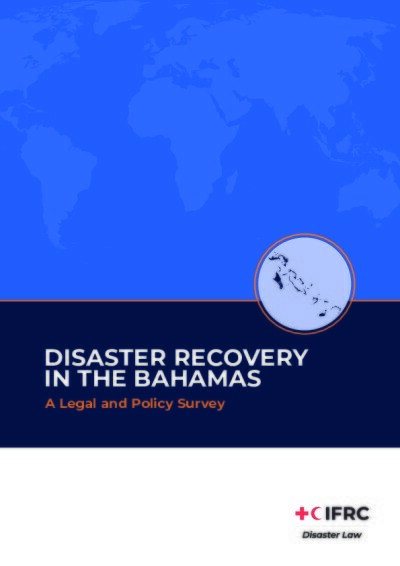
The report, Disaster Recovery in The Bahamas - A Legal and Policy Survey, examines the strengths and gaps in the legal, policy and planning framework for disaster recovery in The Bahamas.
by illustrating the challenges faced during the recovery from Hurricane Dorian and extracting good practices and lessons learned, including an examination of the new Disaster Risk Management Act, of 2022.
When Hurricane Dorian struck The Bahamas in 2019 as the strongest hurricane on record in the Atlantic basin, the devastation was catastrophic on the islands of Abaco and Grand Bahama. Although The Bahamas had experienced major storms before such as Hurricane Joaquin in 2015 and Hurricane Matthew in 2016, it was clear that the scale of destruction brought on by Hurricane Dorian was unprecedented.
The legal preparedness and institutional capacity of the disaster risk management framework to respond and recover from the disaster were severely tested. To undertake the mammoth task of disaster recovery, the government began developing a legal and policy framework dedicated to recovery.
First, through enabling legislation, it established the Disaster Reconstruction Authority to address reconstruction and recovery needs and to develop and implement recovery plans for affected areas after Hurricane Dorian.
Next, the Resilient Recovery Policy, Strategy and Implementation Plan were developed as part of the government’s commitment to increasing resilience against future shocks and its capacity to recover.
Despite there being a new legal and policy framework in place, there were many challenges faced by disaster-affected persons during the recovery process, including a lack of protective safeguards against the risk of sexual and gender-based violence in shelters, a lack of options for the resettlement and integration of migrant communities and a lack of adequate resources for women to rebuild their homes.
The report covers a wide range of thematic areas and proposes recommendations for strengthening laws and policies on disaster recovery in The Bahamas.
The thematic areas examined include institutional arrangements, financing; assessment, planning, monitoring and evaluation, reconstruction and repair of housing and infrastructure, mental health and psychosocial support, education, environmental impacts, protection and inclusion of vulnerable groups, linkages to sustainable development, disaster risk reduction and climate change adaptation and prevention of fraud and corruption.
Click here for the full report.